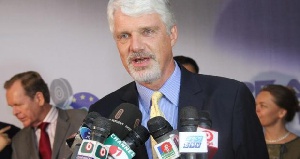William Hanna, Head of the EU Delegation to Ghana, says Ghana must look for innovative financing instruments owing to the reduction in Overseas Development Assistance (ODA) from Ghana’s development partners in recent times.
Mr Hanna, who was speaking at the signing of some four financing agreements under the 11th European Development Fund (EDF)/National Indication Programme recently in Accra, said that was necessary given that Ghana’s development cooperation landscape had changed, with a net ODA disbursement to Ghana as a percentage of its gross national income (GNI) falling from 16.3 percent in 2004 to 2.2 percent in 2013, representing a significant downward trend.
He attributed such development to the positive change in Ghana’s income status, as well as change in the political orientation of development partners.
The signing of the agreement commits a total of €175 million, bringing the accumulative commitments to €269.6 million to support four programmes namely – production investment for sustainable agricultural development in the northern Savannah Ecological zone of Ghana, decentralization in Ghana programme; resilience against climate change, as well as the Public Finance Management and the Stepping Stone Economic Partnership Agreement.
The EU Partners comprised Denmark, France, German, the Netherlands, Switzerland and United Kingdom, who jointly committed a €1.25 billion assistance to support priorities and objectives identified by government in the Long-Term National Development Plan under the European Joint Co-operation Strategy (2017-2020).
“The EU shares in Ghana’s effort to move beyond aid agenda and has been part of a long-term effort to improve the way of work,” he said.
He indicated that the EU shares in the aspirations of supporting Ghana’s key objectives, which among other things, were to build an industrialized, inclusive and resilient economy, as well as build effective, efficient and dynamic institutions.
Ambassador Hanna also added that the EU had also made a decisive shift away from its traditional aid approach to a more comprehensive approach, including trade, competitiveness and focus on global issues such as migration and climate change.
Ken Ofori Atta, Minister of Finance, commended the European partners for their huge support to Ghana over the years, especially the support offered to Parliament, Ghana Audit Service, Public Procurement Authority and Internal Audit, all aimed at deepening accountability and the ethics of those public institutions.
Citing the Accra Agenda for Action (AAA), he stressed the need for both parties to agree to build up towards achieving the AAA in order not to undermine efforts to control public financing and achieving the ‘Ghana Beyond Aid’ agenda.
The Minister of State at the Ministry of Food and Agriculture, Dr Nurah Gyeile, on his part, expressed gratitude to the EU for their support to the Upper West in the area of infrastructure and support to mitigate the harsh climate, as well as provide market-oriented projects.
Business News of Wednesday, 7 February 2018
Source: dailyguideafrica.com













